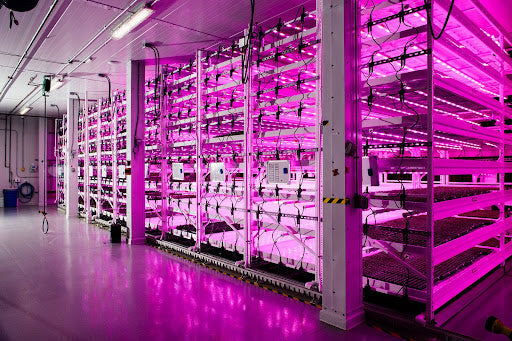
Hydroponic agriculture is transforming farming by allowing plants to thrive in nutrient-enriched water rather than soil. It is becoming increasingly popular for its efficiency, sustainability, and capability to supply fresh fruits and vegetables throughout the year. Nonetheless, many myths regarding hydroponics have continued to generate doubt about its advantages.
Disinformation regarding hydroponic crops typically creates suspicion about their nutritional benefits, environmental impact, and palatability. With urban farming on the increase, there is a need to separate fact from fiction to recognize the actual benefits of this cultivation method.
Let’s debunk the prevalent myths regarding hydroponic agriculture and learn the facts behind why this process is a practical and sustainable choice to conventional agriculture.
Understanding Hydroponic Farming
Hydroponic agriculture is a new way of cultivating crops without soil, with a water solution containing nutrients instead. Through the direct supply of minerals to the roots, plants take in nutrients more effectively, resulting in quicker growth and increased yields. This method avoids soil-borne illnesses and also minimizes the use of pesticides.
Hydroponic systems are also made to consume less water compared to conventional farming, hence being more eco-friendly. From tiny home-based operations to big commercial farms, hydroponic farming is transforming agriculture by providing a cleaner, more controlled growing environment for producing fresh, high-quality crops year-round, independent of climate or soil conditions.
The Rise of Hydroponic Farming
With the rise in urbanization and demand for fresh produce, hydroponic agriculture is becoming increasingly popular globally. As land available for cultivation diminishes, cities are embracing vertical agriculture and hydroponics to have a continuous food supply. The method of hydroponic farming enables plants to be grown indoors, without regard to the changing seasons or adverse weather.
Hydroponic farms, such as Planted Detroit, take advantage of controlled conditions to enhance efficiency, reduce resource use, and offer fresh fruits and vegetables locally. The capacity to produce food within cities lowers transport emissions and makes local food systems more resilient; thus, hydroponic farming is a crucial component of the future of sustainable agriculture.
Common Myths About Hydroponic Farming Debunked
Let us dive into some of the infamous myths around hydroponic farming and debunk them!
Myth 1: Hydroponic Produce Is Not as Nutritious as Soil-Grown Produce
Fact: Hydroponic fruits and vegetables can be as healthy—if not healthier—than conventionally grown produce.
Because hydroponic plants get a carefully crafted solution of nutrients, they receive an optimal amount of vitamins and minerals. Unlike soil farming, in which the amount of nutrients is inconsistent with varying soil quality, hydroponic plants receive their necessary nutrients all the time. Hydroponic leafy greens have been shown through research to be similar in, if not more so, essential nutrients, such as vitamin C and antioxidants.
Planted Detroit guarantees its microgreens are nutrient-dense by carefully controlling and regulating growing conditions, providing consumers with fresh, high-quality produce that contributes to a healthy diet.
Myth 2: Hydroponic Farming Is Not Sustainable
Fact: Hydroponic farming is more sustainable than conventional farming.
Hydroponic farms consume as much as 90% less water than soil farming because water is constantly recycled rather than being lost to runoff. Hydroponic farms also take up less land, avoiding deforestation and minimizing habitat loss.
Most systems, such as those at Planted Detroit, use energy-efficient LED lighting and climate-controlled conditions to maximize plant growth with minimal resource consumption. By obviating the use of chemical pesticides and fertilizers, hydroponic farming also cuts back on environmentally harmful effects. This new mode of agriculture is a step toward an even more sustainable and efficient food system.
Myth 3: Hydroponic Produce Tastes Artificial

Fact: Hydroponic fruit and vegetables are usually fresher and tastier than conventionally grown crops.
Since hydroponic cultivation enables total control over nutrients, light, and water, plants thrive in a perfect setting, intensifying their flavors. Unlike traditionally grown vegetables, which might travel hundreds of miles before ending up on tables, hydroponic greens are picked at their peak freshness and transported rapidly, retaining their flavor and nutritional quality.
Planted Detroit's edible flowers and microgreens are renowned for their rich flavors, hence a popular choice among chefs and food enthusiasts. Through local growing and maintaining quality conditions, hydroponic agriculture yields fresh, tasty, and nutritious food.
Myth 4: Hydroponic Farming Is Only for Large-Scale Farms
Fact: Hydroponic agriculture is very scalable and can be practiced at small as well as large scales.
As commercial hydroponic farms such as Planted Detroit provide fresh food to whole communities, hydroponic systems can also be installed in the home. Small hydroponic systems are sold in kits and used by home gardeners to grow vegetables, herbs, and greens indoors, without regard to weather or soil. This enables one to produce fresh food from home in an apartment or confined area.
For commercial food production or home setups, hydroponic farming provides an effective, efficient, and environmentally friendly way to produce fresh, high-quality fruits and vegetables all year round.
Benefits of Hydroponic Farming You Should Know
The benefits of Hydroponic farming are innumerable. Let us take a look at some of the advantages of hydroponic farming.
Efficient Use of Resources
-
Uses up to 90% less water than conventional farming with closed-loop recycling.
-
Does away with soil-borne diseases, minimizing the use of chemical pesticides.
-
Delivers plants with accurate nutrients, promoting healthier and chemical-free produce.
Year-Round Fresh Produce
-
Not weather-dependent, ensuring consistent food supply.
-
Grows in climate-controlled environments for best growth.
-
Guarantees a constant supply of fresh greens and vegetables year-round.
Supporting Local Food Systems
-
Reduces transportation emissions by producing food nearer to consumers.
-
Delivers fresher, tastier produce with fewer food miles.
-
Helps local economies by providing restaurants, markets, and food banks with fresh, sustainable produce.
How Planted Detroit Champions Hydroponic Farming
Planted Detroit owns and operates Michigan's largest vertical hydroponic farm, focusing on sustainable farming. We use advanced hydroponic methods to produce microgreens and edible flowers in a pesticide-free, controlled setting. Our system maximizes resource use through reduced water consumption and minimal environmental footprint.
Providing Fresh, Local Produce
We deliver fresh to neighborhood restaurants, grocery stores, and food hubs. Planted Detroit empowers the local food system by increasing the availability of healthy, locally produced food. Our initiative decreases food miles and transport emissions, providing fresher and more sustainable produce to the community.
Educating and Advocating for Urban Farming
We participate in community education programs, educating the advantages of hydroponic farming, and work with schools and organizations to raise awareness of urban agriculture. We also promote hydroponic farming as a solution to food insecurity, emphasizing its efficiency and sustainability.
Embracing the Future of Farming
Hydroponic farming is revolutionizing agriculture by giving a sustainable, efficient, and resource-friendly method of cultivating fresh fruits and vegetables. Contrary to popular beliefs, the system has been as nutritious, if not more nutritious, than conventional farming, with much less water and land requirements.
Misconceptions that hydroponics is unsustainable, tastes artificial, or is only feasible for large farms have been eliminated, highlighting its flexibility and green credentials. By lowering transportation emissions and providing year-round production, hydroponic farms such as Planted Detroit is an important part of building resilient local food systems.

Planted Detroit is an important part of building resilient local food systems. As urban communities expand and climate pressures mount, adopting hydroponic farming can provide steady access to fresh, nutritious produce with reduced environmental pressure. Whether by large-scale operations or weekly home delivery, this cutting-edge method of agriculture is revolutionizing the future of food.
Try hydroponically cultivated items from Planted Detroit and start your journey in sustaining a greener food system. We provide fresh, locally sourced hydroponic microgreens to deliver high-quality, nutrient-dense produce to the consumer. Our sustainable agricultural practices offer an environmentally friendly solution over conventional farming methods. Try it out by purchasing directly from our product page for easy access to fresh greens.
To get updated on the new hydroponic farming, follow Planted Detroit for announcements on sustainable farming and urban farm projects. Supporting local farms serves to fortify food systems, lessen environmental footprints, and cultivate healthier communities. Join the effort towards a greener future by discovering more about hydroponics and adopting pioneering farming solutions.
